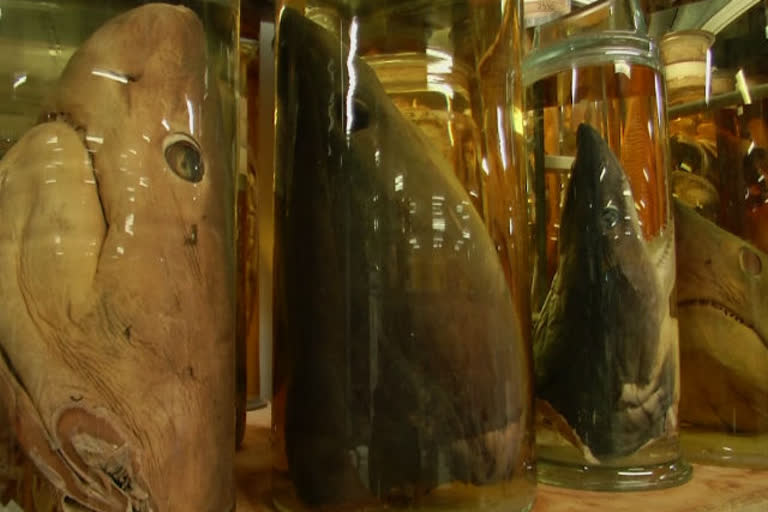London: An upcoming science mission to map the Indian Ocean off the Seychelles hopes to shed new light on an ancient fish, once thought to have become extinct 70 million years ago. Scientists had believed the coelacanth disappeared with the dinosaurs, until a specimen was discovered by a South African fish trawler in 1938.
A preserved specimen of a coelacanth sits in a store room at London's Natural History Museum.
At one time, scientists thought coelacanths died out some 70 million years ago, science only knew it from fossils. But in a startling discovery in 1938, a South African fish trawler caught a living specimen of the deep sea fish. Its close resemblance to its ancient ancestors earned it the "living fossil" nickname.
Coelacanths have captured the public's imagination ever since.
Scientists hailed its discovery, particularly because it's closely related to a fish lineage that slowly evolved to move from the waters and begin crawling on land. Providing a link to land-dwelling creatures, including frogs, lizards, mammals, even ourselves. Its fleshy fins slightly resemble the limbs on four-legged land animals.
"This was the missing link between bony fishes and tetrapods, including human beings, so this was a fantastic expectation," explains Oliver Crimmen, senior fish curator at the Natural History Museum.
"The fact that we hadn't seen them before except as fossils meant also that it apparently seemed to have sort of resurrected itself from extinction."
Crimmen says while western scientists believed the fish had become extinct, locals on the islands off the coast of South Africa had known about the "dinosaur fish."
"People who live in habitats where species we've not encountered in science before, of course, they're not new to them," he says.

"And local people in the islands off South Africa knew of coelacanths, but the western scientific world didn't, they'd only got fossils. So, a living one was a great shock, we'd expected them to have disappeared."
In recent years, scientists have used high-tech submersibles to study the coelacanth in its natural habitat - deep sea caves off the coast of South Africa.
There are only two known living species. According to the IUCN's Red List, the coelacanth - Latin name "Latimeria chalumnae" - remains critically endangered, fishing and the harvesting of aquatic resources now the main threat to its existence.
Crimmen believes it's hard-to-reach habitat and poor taste might be why it's managed to survive till now.
"It lives in rocky subterranean caverns, at some depth. And it's not a place where you can fish easily. Add to that, it's not very nice to eat. It causes an intestinal inflammation because of the oils and chemicals in its flesh. And so, they were thrown back even by the locals when they were caught" he explains.
A science mission about to get underway in the Seychelles hopes to shed new light on the coelacanth and its deep ocean habitat.
The ambitious Nekton "First Descent" Indian Ocean mission will delve into one of the last major unexplored frontiers on the planet.
Researchers will spend seven weeks surveying underwater life, mapping the sea floor and collecting data while in submersibles 300 meters down.
"We're not going to find dinosaurs, but we may well find the coelacanth, which is a fish that actually, in terms of the group it belongs to, is much older than the dinosaurs. It's a living fossil," says Alex Rogers, a Nekton trustee and University of Oxford professor.
Little is known about the watery world below depths of 30 metres.
The Nekton mission will travel to points of interest across the Indian Ocean, including the UNESCO-listed Aldabra, one of the world's largest coral atolls.
"Although there's been a lot of work in the shallow water, looking at the ecology of coral reefs, for example, there's been almost no work on the deep waters around the Seychelles," says Rogers.
"So, what's actually living there, we don't know yet and the intention is to find that out."
Nekton's "First Descent" Indian Ocean Mission is expected to set to sail from the Seychelles in early March.

Also read- Netanyahu has done 'great job', says Trump
(With inputs from APTN)



